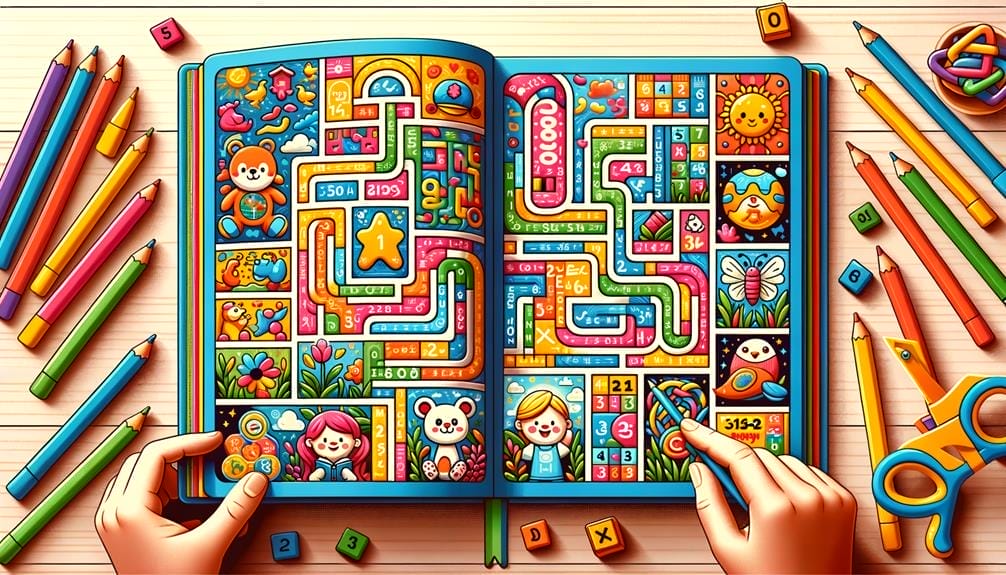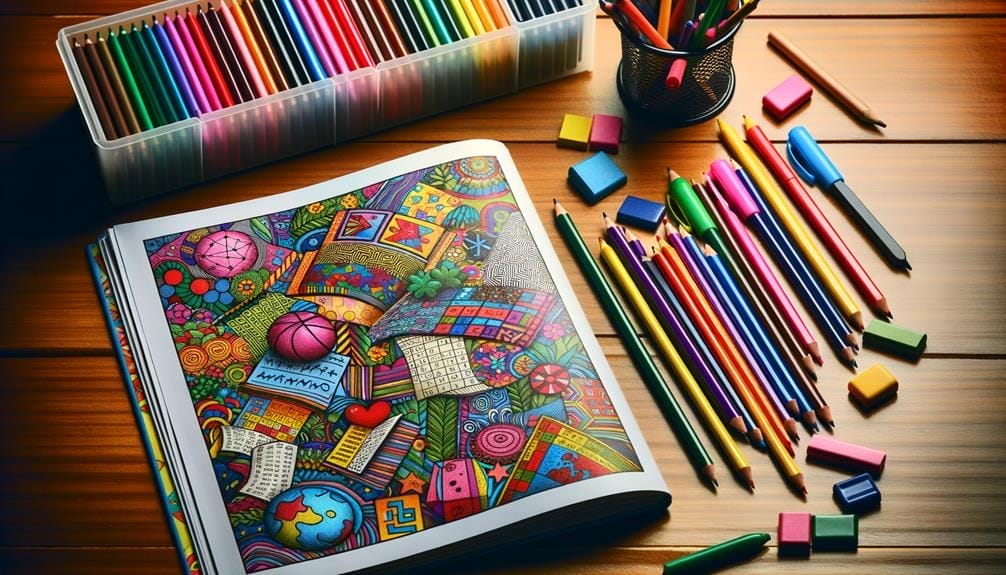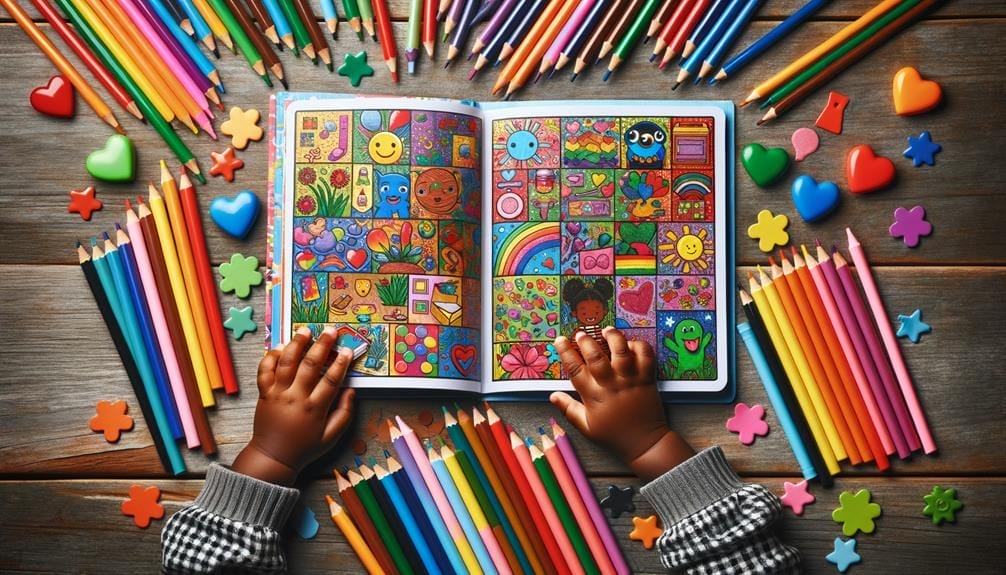Imagine a world where young minds are filled with wonder and excitement as they embark on a journey of exploration and discovery through the pages of preschool learning activity books.
These books are more than just tools for education; they are gateways to a realm where imagination meets knowledge.
As you flip through the vibrant pages and engage in stimulating tasks, you'll witness the magic of early childhood learning unfold before your eyes.
Discover how these activity books can ignite a passion for learning in your little one and set a strong foundation for their future academic success.
Key Takeaways
- Enhance early literacy and math skills in children aged 3 to 6.
- Boost cognitive development through problem-solving and memory activities.
- Develop fine motor skills like hand-eye coordination and dexterity.
- Encourage creativity and imagination with artistic tasks and color experiments.
Benefits of Preschool Activity Books
Discover the countless benefits that preschool activity books offer in fostering early literacy and math skills in young children aged 3 to 6.
These books are specially designed to engage kids in interactive activities like matching games, letter recognition, and basic counting. By incorporating colorful illustrations and fun exercises, preschool activity books make learning enjoyable and effective for kids at this crucial age.
Children can enhance their early literacy skills through activities focused on letter sounds, sorting, and beginning phonics. Matching games included in these books not only improve cognitive skills but also aid in developing important pre-reading abilities.
Parents can witness their child's progress firsthand as they complete structured tasks that build a strong foundation for future academic success. By actively participating in these activities, kids ages 3 to 6 can boost their confidence, feel accomplished, and establish a solid groundwork for more advanced math and reading concepts.
Cognitive Development Activities
Are you ready to boost your child's problem-solving skills through engaging memory games and puzzles found in preschool activity books?
These activities not only enhance memory and attention span but also foster critical thinking and decision-making abilities.
Memory Games for Kids
Engage your child's mind and boost their cognitive development with stimulating memory games designed to enhance memory retention and recall abilities. Memory games for kids offer a fun way to improve concentration, attention to detail, and problem-solving skills.
These activities not only enhance cognitive skills like visual memory and spatial awareness but also provide an engaging platform for kids to expand their memory capacity.
To make the most out of memory games, consider adapting them to different age groups and difficulty levels, ensuring a challenging yet stimulating experience for young minds.
- Enhances memory retention and recall abilities.
- Improves concentration, attention to detail, and problem-solving skills.
- Fun and engaging way to practice and develop memory capacity.
Problem-Solving Puzzles for Preschoolers
Dive into the world of problem-solving puzzles tailored for preschoolers to enhance their cognitive development and critical thinking skills.
These activities, often found in preschool activity books, are designed to engage young minds in a fun and educational way. By solving puzzles like hidden pictures and other brain teasers, children learn to analyze, strategize, and think creatively.
These cognitive development activities not only promote critical thinking but also help kids improve their problem-solving abilities. As preschoolers search for solutions within the puzzles, they're actively exercising their logic and reasoning skills.
Completing these puzzles isn't only entertaining but also essential for building the cognitive skills necessary for academic success. So, grab an activity book and start unraveling those hidden pictures today!
Fine Motor Skill Exercises
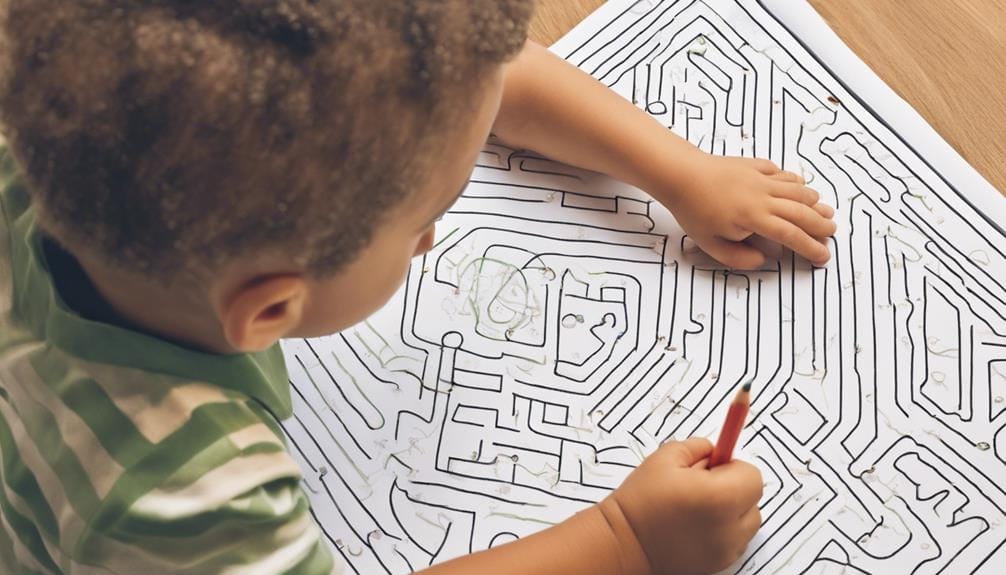
Fine-tune your child's motor skills with engaging exercises found in preschool activity books that focus on hand-eye coordination and dexterity. These activities are designed to help your little one develop essential fine motor skills through fun and interactive tasks.
Here are some key elements you can expect in these exercises:
- Finger strengthening exercises, pencil control: Strengthening those tiny muscles in the fingers is crucial for improving grip strength and enhancing control when holding a pencil or crayon.
- Hand-eye coordination, dexterity drills: Practicing activities that require coordination between hands and eyes helps refine motor skills and promotes better control over movements.
- Precision activities, cutting practice: Engaging in precision-based tasks like cutting along lines or coloring within boundaries aids in developing precise movements and attention to detail.
Creativity Boosting Tasks
Are you ready to unleash your creativity with artistic drawing challenges, color mixing experiments, and shape sorting games?
These tasks aren't just fun but also help you think creatively and critically.
Let's dive into these activities and see how they can boost your imagination and problem-solving skills!
Artistic Drawing Challenges
Boost your preschooler's creativity with engaging artistic drawing challenges found in activity books that encourage imaginative thinking and self-expression.
Dive into a world of artistic exploration and drawing techniques that inspire young minds to think creatively.
Encourage imaginative creations by prompting your child to draw unique habitats for animals or create their imaginary creatures. These challenges not only enhance artistic skills but also foster self-expression and confidence in your little one.
As they explore different art techniques through these tasks, they develop fine motor skills and hand-eye coordination.
Let your preschooler unleash their creativity and build a strong foundation for future artistic endeavors with these fun and educational drawing challenges.
Color Mixing Experiments
Explore a world of vibrant creativity and discovery as you engage in color mixing experiments designed to spark imaginative exploration and artistic expression in preschoolers.
Color exploration becomes a magical journey as little ones mix primary colors like red, blue, and yellow to unveil secondary colors such as purple, green, and orange. These experiments go beyond just creating new colors; they introduce children to basic science concepts and color theory in a hands-on and engaging way.
Through blending colors together, kids not only craft rainbow creations but also enhance their fine motor skills using tools like paintbrushes or fingers. Encouraging these color mixing adventures fosters curiosity, discovery, and a love for artistic expression in young minds.
Shape Sorting Games
Engage young learners in the captivating world of shape sorting games to ignite their creativity and critical thinking skills.
Dive into the realm of shape matching challenges, spatial awareness, hands-on shape sorting, fine motor skills, visual discrimination tasks, and problem-solving skills.
These games not only help children identify and categorize shapes but also enhance their spatial awareness and fine motor skills.
By engaging in matching shapes in various contexts, kids are encouraged to develop their problem-solving abilities and visual discrimination skills.
The shape sorting tasks provided in activity books offer a fun and interactive way for children to practice sorting and classifying objects based on different attributes.
Interactive Games for Learning
Immerse your child in a world of interactive games that foster essential skills like counting, matching, and letter recognition in preschool learning activity books. These playful learning methods are more than just fun; they're interactive educational tools designed to engage your child in a dynamic learning experience.
Through engaging teaching techniques like puzzles, mazes, and matching games, these activities enhance your child's cognitive development, problem-solving skills, concentration, memory, and fine motor skills.
The interactive components in these books make learning an exciting adventure, encouraging children to actively participate in their educational journey. By incorporating interactive games, children can practice early literacy and math concepts in a playful and engaging way, fostering a love for learning from an early age.
Colorful Coloring Pages

How do the vibrant and engaging coloring pages in preschool learning activity books help children develop essential fine motor skills and reinforce learning concepts through creative expression? The colorful coloring pages within these books serve as more than just a fun pastime; they play a crucial role in early childhood development. Here are some ways these pages benefit young learners:
- Color recognition games: Engaging in coloring activities helps children learn to identify and differentiate between various colors, enhancing their visual perception skills.
- Creative drawing challenges: By encouraging kids to color within the lines or create their own drawings, these books foster creativity and artistic expression.
- Imaginative storytelling activities: Many coloring pages are accompanied by prompts or scenes that inspire children to invent stories, boosting their narrative skills and imagination.
Through nature-themed coloring pages, animal shape sorting, and outdoor adventure puzzles, children not only refine their fine motor skills but also reinforce learning concepts in a playful and interactive manner.
Hands-On Puzzles for Kids
As young children explore the vibrant world of preschool learning activity books through engaging hands-on puzzles, they embark on interactive learning adventures that foster cognitive skills and critical thinking abilities. These interactive puzzles are designed to make learning enjoyable and beneficial for preschoolers aged 3 to 6. By engaging in hands-on learning experiences, children can enhance their problem-solving skills and develop a deeper understanding of various concepts.
| Hands-On Puzzles | Description | Learning Outcome |
|---|---|---|
| Mazes | Navigate through paths to reach the end | Spatial awareness |
| Matching Games | Pair related items or shapes | Memory skills |
| Dot-to-Dots | Connect the dots to reveal a picture | Number sequencing |
| Scavenger Hunts | Search and find specific items | Observation skills |
| Hidden Pictures Puzzles | Find hidden objects within a larger picture | Attention to detail |
These interactive puzzles cover a wide range of concepts such as ABCs, sight words, colors, shapes, numbers, patterns, sorting, and opposites. Encouraging preschool fun, these hands-on activities in learning books provide a holistic approach to early childhood education.
Educational Sticker Activities
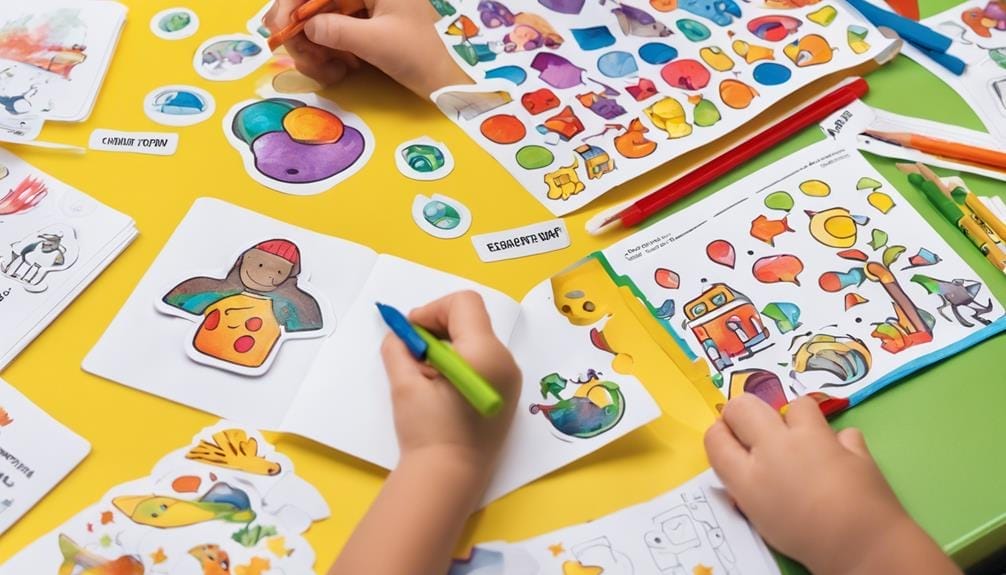
Hey there!
Let's talk stickers!
Educational sticker activities aren't just fun but also super beneficial for your preschooler's development.
Get ready for creative projects, exciting sticker ideas, and a whole lot of learning through play!
Sticker Learning Benefits
Engage your young learners in fun and educational sticker activities that enhance their fine motor skills and creativity. Sticker learning offers a range of benefits that contribute to your child's development:
- Motor Skill Development, Creativity Enhancement: Sticker activities require precise hand movements, improving fine motor skills while encouraging creativity.
- Spatial Awareness, Hand-Eye Coordination: Placing stickers accurately on surfaces enhances spatial awareness and hand-eye coordination in children.
- Imagination Growth, Sorting Skills: By using stickers in various activities, children can unleash their imagination and practice sorting, matching, and categorizing skills.
These sticker-based activities not only make learning engaging but also help in the holistic development of your preschooler.
Creative Sticker Projects
Get ready to embark on a journey of creativity and learning with these engaging and educational sticker projects for preschoolers. Sticker art projects not only spark imaginative play but also provide developmental benefits by enhancing fine motor skills and hand-eye coordination.
Through hands-on creativity, children can explore shapes, colors, numbers, and more in a fun and interactive way. These activities promote learning engagement, allowing kids to reinforce educational concepts while having educational fun. Sticker books offer a playful approach to learning that helps children develop key skills while enjoying the process.
Whether at home or in school, these projects are designed to make learning enjoyable and beneficial for young learners.
Sticker Activity Ideas
Embark on a journey of creativity and learning through fun and engaging educational sticker activities designed to enhance fine motor skills and spark imagination in preschoolers. Sticker activities offer a wide range of benefits, including:
- Sticker story creation, imaginative play: Encourage children to create their own stories using stickers, fostering creativity and language development.
- Fine motor skills, dexterity development: Peeling and placing stickers help improve hand-eye coordination and fine motor skills in young learners.
- Color matching, shape recognition: Sticker activities that involve matching colors or shapes support cognitive development and enhance visual skills.
These interactive tasks make learning enjoyable and effective for preschoolers, providing a hands-on approach to education.
Shape and Pattern Recognition

Shape and pattern recognition activities in preschool learning books provide a fun and educational way for children to explore and master basic geometric concepts. These activities include shape identification games, pattern creation challenges, and visual discrimination tasks. By engaging in these tasks, preschoolers enhance their cognitive skills and develop essential pre-math abilities. The following table illustrates how these activities can help children in recognizing shapes and patterns:
| Shape Identification Games | Pattern Creation Challenges | Visual Discrimination Tasks |
|---|---|---|
| Matching shapes to objects | Extending and creating patterns | Identifying similarities and differences |
| Sorting shapes by attributes | Completing pattern sequences | Recognizing shapes in different orientations |
| Naming shapes in the environment | Using shapes to create designs | Distinguishing patterns from backgrounds |
Preschool learning books focus on shape and pattern recognition as foundational skills for later math concepts and problem-solving abilities. These activities not only make learning enjoyable but also lay the groundwork for spatial awareness and critical thinking skills.
Numbers and Counting Practice
Immerse yourself in the world of numbers and counting with engaging activities that will enhance your preschooler's math skills and problem-solving abilities. Counting practice is more than just reciting numbers; it involves developing essential skills like number recognition, quantitative reasoning, and number sequencing.
Here are three key points to consider when engaging in numbers and counting activities:
- Counting Strategies and Number Recognition: Encourage your child to count objects around them, match numbers to corresponding quantities, and identify numbers in various contexts. This helps in solidifying their understanding of numbers and their value.
- Quantitative Reasoning and Number Sequencing: Through activities that involve arranging numbers in order and comparing quantities, preschoolers begin to grasp the concept of more or less, laying the groundwork for future mathematical concepts.
- Math Foundation and Cognitive Development: Building a strong foundation in numbers and counting not only enhances math skills but also boosts cognitive development, problem-solving abilities, and critical thinking skills.
Engaging in these activities won't only make learning numbers enjoyable but also foster a love for math from an early age.
Recommended Preschool Activity Books
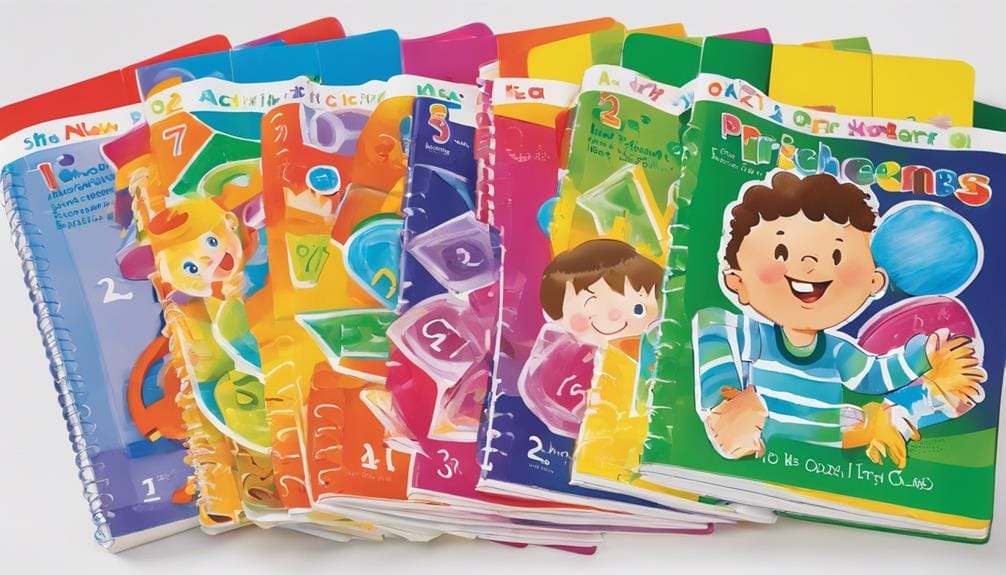
Delve into a world of creativity and learning with these recommended preschool activity books designed to enhance early literacy and foundational skills for children aged 3 to 4. These books are not only fun but also play a crucial role in developing early literacy skills and encouraging play-based learning. Parental involvement is key to maximizing the benefits of these activity books, as they provide an excellent opportunity for parents to engage with their children while supporting their learning journey.
Here are some top recommended preschool activity books that focus on early literacy, math, and foundational skills:
| Activity Book | Key Features |
|---|---|
| "ABCs and 123s Workbook" | Interactive activities for letters and numbers |
| "Rhyme and Play Activity Book" | Nursery rhymes and language development |
| "Math Adventures" | Basic math concepts through play |
| "Art Exploration" | Creativity and fine motor skills |
| "Science Discoveries" | Introduction to science concepts |
These books not only engage children in fun activities but also support their holistic development through interactive and educational content.
Frequently Asked Questions
How Do You Make a Preschool Activity Book?
To make a preschool activity book, focus on creating engaging, interactive, educational, colorful, and fun content. Incorporate matching, tracing, coloring, stickers, and clear instructions. Tailor activities to different learning styles for an inclusive learning experience that captivates young minds.
What Should Be in a Children's Activity Book?
In a children's activity book, include creative exercises, engaging illustrations, hands-on activities, and interactive content. Educational games develop essential skills. Make learning fun by incorporating puzzles, mazes, matching games, and scavenger hunts. Support developmental growth while fostering creativity and critical thinking.
What Kind of Books Are Suited for Preschool and Kindergarten?
For preschool and kindergarten, choose picture books, interactive books, storytime reads, coloring books, and engaging educational games. Hands-on activities help young minds explore and learn. These resources foster creativity, curiosity, and early academic skills.
Conclusion
In conclusion, preschool learning activity books are a fun and effective way to help your child develop essential skills while fostering a love for learning.
For example, Sarah, a 4-year-old, improved her counting and matching skills with the 'ABCs and 123s' activity book, boosting her confidence and enthusiasm for learning.
By incorporating these books into your child's daily routine, you can support their cognitive development and set them up for success in school and beyond.
Start your child's educational journey today with preschool activity books!
